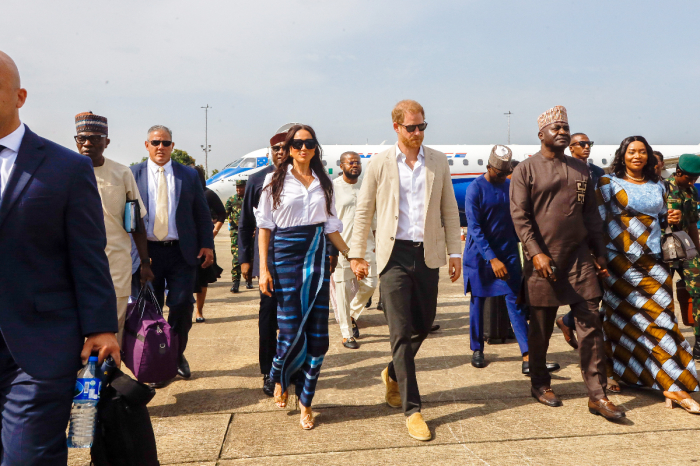Harry and Meghan rebuked for ‘photo op’ tour amid backdrop of 'genocide'

Prince Harry and Meghan Markle's recent visit to Nigeria has sparked criticism, with a leading rights activist calling it a superficial public relations exercise that ignored the ongoing violence against Christians that some say has reached genocidal levels.
The Duke and Duchess of Sussex's three-day tour earlier this month aimed to promote mental health and the Invictus Games. However, the leader of the U.S.-based watchdog group International Christian Concern called the visit tone-deaf to the suffering facing thousands.
In a statement shared with The Christian Post Monday, ICC President Jeff King condemned the royal couple's visit for ignoring what the ICC calls "the ongoing genocide of Christians in Nigeria."
"I'm sure Harry and Meghan's recent trip was well-intentioned, but it was sadly a safari squandered," King stated.
"Their trip came off as a crass PR exercise and photo-op while they wandered through a country of untold suffering. In the last 20 years, Nigeria's Islamists have murdered up to 100,000 Christians and stolen three million farms from Christians. But all we heard from the Duke and Duchess of Sussex was sunshine and rainbows."
Markle, who is of Nigerian descent, described the trip as "eye-opening" and "humbling," according to The New York Post. The trip included visits to various locations in Lagos and Abuja. They said it was part of their mission to promote mental health for young people and support the rehabilitation of injured military personnel through the Invictus Games.
During the visit, the couple attended the Dream Big Basketball Clinic in Lagos, interacted with children at the Lightway Academy and met with Nigeria's military officers, The Telegraph noted.
Markle expressed her connection to Nigeria, calling it "my country," and her desire to empower the young people she met.
"I see myself in them. I see the potential in all of these young girls — and, by the way, in these young boys as well," she was quoted as saying.
Prince Harry also spoke about the importance of meeting people face-to-face to instigate change.
It was "hugely important" for the couple to meet directly with people to bring about solutions, support and positive change, he said.
ICC President King highlighted the contrast between the couple's visit and the work of Harry's mother, Princess Diana.
"Harry would have done well to remember Diana's mission-minded trips that combined being a world-leading ambassador while simultaneously lifting up the forgotten victims of oppression and war," he said.
The couple also visited Nigeria's Defense Headquarters in Abuja, where they met with servicemen and their wives before having a private meeting with Nigeria's Chief of Defense Staff Gen. Christopher Musa.
The persecution of religious minorities, including Christians and minority Muslims, is severe in Nigeria. Open Doors, a global Christian persecution watchdog organization, reports that more Christians are killed for their faith in Nigeria than in any other country.
In its World Watch List 2024 report, Open Doors, which relies on conservative estimates, stated that at least 4,998 Christians were killed for their faith worldwide in the 2023 reporting period. Of that number, around 90% of those were in Nigeria, where more than 4,000 were killed. Open Doors ranks Nigeria as the sixth-worst country in the world when it comes to Christian persecution.
The Anambra-based International Society for Civil Liberties and Rule of Law, an organization headed by Christian criminologist Emeka Umeagbalasi that has been very critical of the Nigerian government, estimates that at least 8,222 Christians were killed across Nigeria from January 2023 to January 2024.
The Christian community and global rights advocates have long called on the Nigerian government to thwart deadly massacres carried out on predominantly Christian farming communities in Middle Belt states by radicalized herdsmen. While the Nigerian government and its diplomatic allies have placed blame on decades-old "farmer-herder" clashes, rights advocates have long argued that religious elements to these crimes can't be ignored.
The U.S. Commission on International Religious Freedom has repeatedly called on the Biden administration to list Nigeria on the State Department's list of countries of particular concern for egregious religious freedom violations after it was removed from the list in 2021.
Members of Congress have passed resolutions calling for greater U.S. action in response to Nigeria's religious freedom crises. They have also drawn attention to religious prisoners of conscience and egregious blasphemy laws in Nigeria.
United Nations experts recently called for the immediate and unconditional release of Yahaya-Sharif Aminu, who was sentenced to death in 2020 for sharing allegedly blasphemous song lyrics on WhatsApp that offended Islam and remains in prison in Nigeria awaiting a Supreme Court appeal.
The experts — including Alexandra Xanthaki, special rapporteur in the field of cultural rights; Nazila Ghanea, special rapporteur on freedom of religion or belief, and Irene Khan, special rapporteur on the promotion and protection of the right to freedom of opinion and expression — issued a statement urging the Nigerian government to abolish the death penalty for blasphemy.
The U.K. Parliament has also condemned Sharif-Aminu's sentence and imprisonment.
"The UK Government opposes the death penalty in all circumstances. We will continue to raise Mr. Sharif-Aminu's case as he appeals his sentence," stated the Parliament, conveying their support for freedom of religion and belief in Nigeria.





























